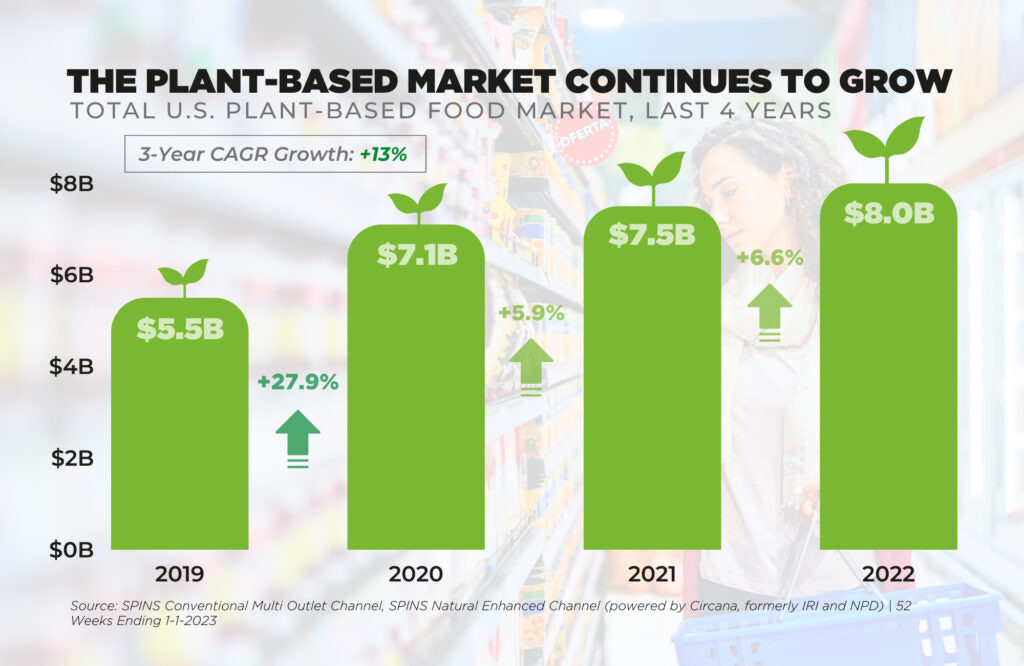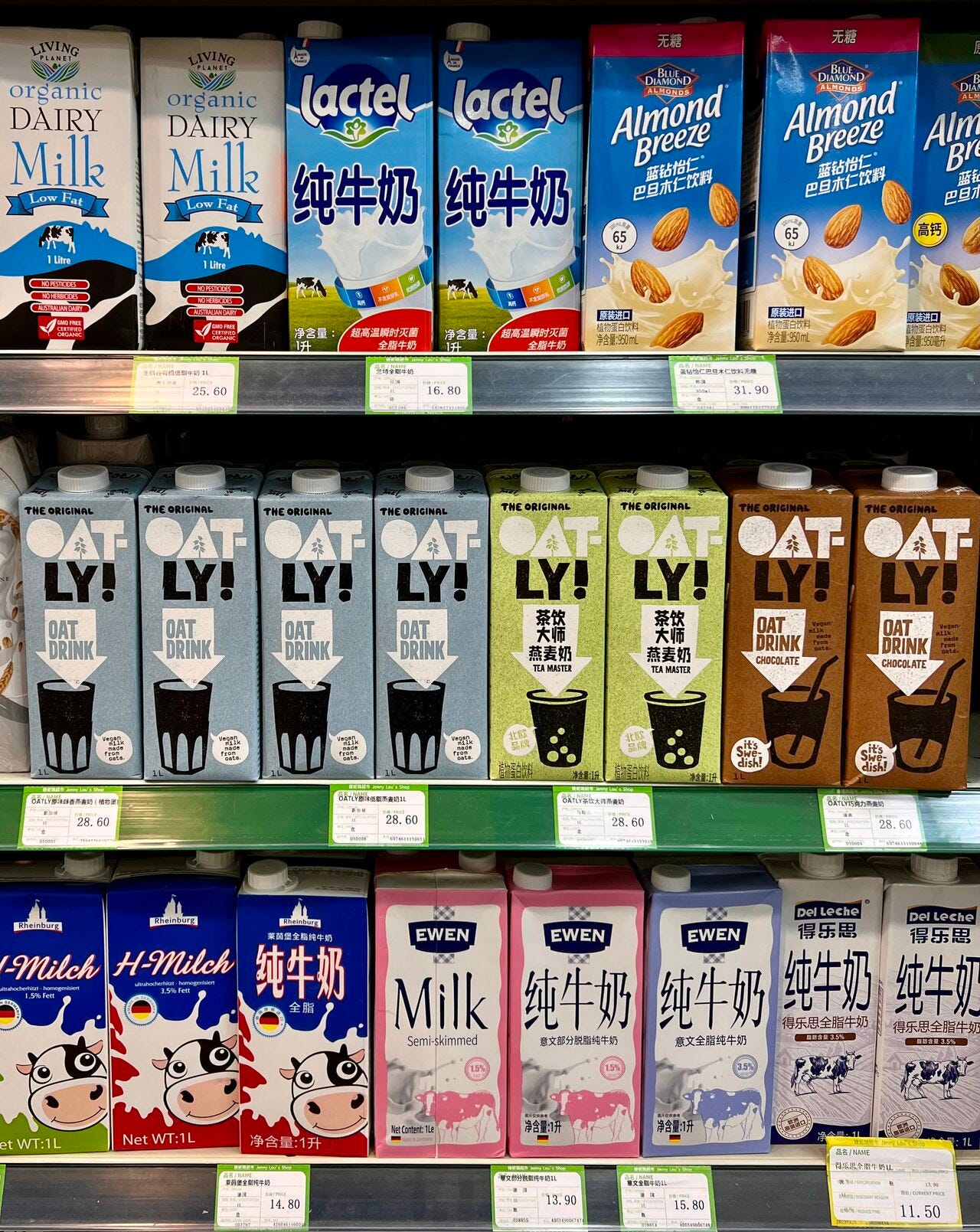Better Bioeconomy Weekly - Apr 17th 2023 🌏
If we can achieve a 50% reduction in food loss and waste, we can eliminate about 25% of the total greenhouse gas emissions from our food system.
WORD BUFFET 📖
💡 GFI Reports on the State of the Plant-Based, Cultivated Meat, and Precision Fermentation Industry
The plant-based food industry is booming with $8 billion in sales last year, and major retail brands are investing in it.
Cultivated meat and precision fermentation sectors raised almost $2 billion, with meat producers investing in these sectors to address global challenges.
Fermentation funding grew by almost 70% in the APAC region and 37% in Europe, with over 700 unique investors showing interest.
Read article, Read full report
🌱 Plant-Based Food Sales Grow Despite Inflation and Lackluster Performances
Despite a dip caused by some plant-based category leaders, the plant-based food sector in the U.S. reached $8 billion in sales in 2022, growing by 6.6%, driven by mainstream, flexitarian consumers.
Plant-based milk sales account for 15% of all fluid milk sales, and vegan milk sales grew by 9% to $2.8 billion.
Vegan meat sales remained steady, with vegan chicken driving most sales.
🥩 ADM and Believer Meats Collaborate on Cultivated Meat Products Development
ADM has been working with Believer Meats (previously Future Meat Technologies) since 2021 to advance their cultivated meat technology and commercialize their products.
ADM may also provide manufacturing and distribution support for approved products.
The global ingredient giant is partnering with alternative protein firms to promote sustainable protein production and ensure food security as the global population grows.
“Cultivated meat represents an exciting evolution and yet another way to meet long-term food security needs — along with other traditional and novel sources of protein.” - ADM Global Foods President, Leticia Gonçalves
🧀 French Cheese Giant Bel Group Partners with Climax Foods to Develop AI-Powered Plant-Based Cheese Products
Bel Group and Climax Foods are partnering to develop low-carbon, nutritious, and affordable plant-based cheese products that are indistinguishable from dairy cheese.
By using predictive analytics and AI, Climax Foods can speed up the product development process and create plant-based versions with identical texture, flavor, and nutrition density to animal-based foods.
Bel aims to launch new plant-based products in the U.S. and Europe by 2024 and transition to a new food system model that can feed 10 billion people by 2050 with minimal environmental impact.
🏭 Liberation Labs Raises $30M to Address Biomanufacturing Capacity Bottlenecks With Fit-For-Purpose Precision Fermentation Facility
Precision fermentation startups face challenges in scaling up due to outdated infrastructure and lack of investor support. “The average contract manufacturing facility people are using today is 50 years old and it was built for pharmaceuticals.” said co-founder and CEO Mark Warner.
Liberation Labs is building a new facility in Richmond with 600k litres of capacity to address these issues and offer processing capabilities.
They aim to establish a worldwide network of biomanufacturing facilities for precision fermentation startups, established ingredients companies, and CPG brands.
🚮 Food Waste Makes Up 50% of Global Food Emissions
Food waste in 2017 produced 9.3 billion tonnes of CO2e emissions, which is equivalent to the combined emissions of the U.S. and the E.U.
Emissions from China, India, the U.S., and Brazil generated over 44% of the global supply-related emissions from food waste and 38% of global waste-management-related emissions.
Over 33% of all food produced globally is wasted, leading to emissions losses due to methane and CO2.
Strategies to reduce food waste include halving meat consumption, deploying technological advances, and halving food loss and waste generation.
UN aims to cut food waste by 50% by 2030, which could reduce 25% of GHG emissions from global food.
🐶 Cult Food Science Partners With JellaTech to Launch Collagen-Enhanced Pet Foods Using Functional Animal-Free Collagen

The collagen used in Indiana Pets, CULT's upcoming pet food brand, is cell-cultured and provides premium nutrition to dogs with a much lower environmental impact.
Collagen has been shown to benefit dogs living with osteoarthritis and other mobility issues, and JellaTech's high-purity collagen is formulated specifically for senior and active dogs to improve their joint health, comfort, and mobility.
Lab-grown collagen requires less water and land and produces fewer greenhouse gases compared to traditional animal-based collagen that requires slaughtering animals and processing skin and bones to extract the collagen.
🇮🇹 Italy's Ban on Cultivated Meat Could Worsen Climate Change, as Europe Warms Twice as Fast as the Global Average
The new Italian government proposed a ban on cultivated meat production and marketing, and is considering a similar ban on insect-based protein, which could limit sustainable food sources and consumer choice.
This move could worsen Italy's already threatened food system due to climate change, with animal agriculture being one of the worst climate offenders, responsible for 14% of global carbon emissions.
The food sector alone could add nearly 1°C to global warming by 2100.
Cultivated meat emits up to 92% less carbon gas equivalents than conventional beef production and uses up to 90% less land, making it a more sustainable alternative.
“Here in Italy we are fanatics with our food. So when politicians use the word ‘synthetic’—which is incorrect because cultivated meat is real meat—it is something like blasphemy for us,” said Stefano Lattanzi, CEO of Italian cultivated-meat consortium Bruno Cell.
👩🏾🌾 Women’s Equality in Agrifood Systems Could Boost the Global Economy by $1 Trillion, Reduce Food Insecurity by 45 Million
Empowering women and reducing gender inequalities in agrifood systems can lead to reduced hunger, improved economy, and increased resilience to shocks like climate change and pandemics.
Women make up 36% of the workforce in agrifood systems globally, but they face marginalization, low-skilled work, less access to resources, and a gender pay gap in agriculture.
The FAO report recommends interventions to address access to assets, technology, education and training, land-tenure security, social protection programs, and gender-transformative approaches.
📊 Five New Trends to Spot in the Future of Food
Regenerative food, is the biggest trend in food right now, with more brands using the term "regenerative" to greenwash their products. However, with money flowing into the regenerative space and consumer demand growing, this trend seems to be here to stay.
Nostalgia branding, where leading future of food brands are using old marketing campaigns and creating plant-based products to imitate childhood favorites. This trend could be spotted across both consumer brands and startup brands.
Science and technology are increasingly being used to create food products, with machine learning and AI being used to create hyper-realistic plant-based cheese and improve health benefits in food. These early brands will dictate whether this trend continues on or fizzles out.
Cultivated meat products are expected to debut to the U.S. public later this year, and clever innovators are using the same technologies to recreate many of the world's other biggest polluters in the food system.
Meat-free whole cuts are becoming the next big thing, as chicken accounts for more than 95% of meat produced in the U.S. Meat-free whole cuts have come a long way in a short period of time and may overtake meat-free burgers in only a few years' time.
SOCIAL FEAST 📱
🥛 Oatly Takes Over Beijing: A Masterclass in Localized Distribution
Oatly has successfully localized and distributed their products in Beijing, China, with various collaborations and localized SKUs.
It is the only alternative milk option available at Starbucks in Beijing, and can also be found at McDonald's McCafe and KFC's K Coffee for a small additional cost.
Oatly has experienced significant growth in Asia, with over $150m in sales in 2022, and a major local conglomerate, China Resources, as a major shareholder.
🌍 Why Talk About the Impact of Meat and Dairy on the Environment? Because It Works.
A study showed that interventions designed to reduce meat consumption were successful, reducing the overall odds of consuming meat by 82%.
Informational messaging was the most common intervention used (80.6%) to reduce meat consumption, followed by strategies that modified menu presentation and arrangement (35.5%).
Multimodal interventions that combine informational messaging with better options yield the best results. It is not about shaming or restricting, but rather informing, engaging, and providing better choices.
EAR FOOD 🎵
💬 Sonalie Figueiras on the Importance of Education, Communication, Diversity and Inclusion in the Alt Protein Industry
Sonalie Figueiras, Founder and Editor-in-chief of Green Queen, emphasizes the need for investment in food tech and better messaging in the alternative protein industry.
Startups are not focusing enough on branding and customer engagement, while investors overlook the importance of consumer education.
There is a significant gap in understanding between the industry and the public, with many unaware of the impact of food production on the environment.
She also advocates for more diversity in the investing space, which is currently male-dominated.

🔒 From Cultured Meat to National Security: The Journey of Jason Matheny
Jason Matheny founded New Harvest to promote cultured meat, and gained recognition from media and industry for his efforts.
He transitioned his focus to national security and technological advancement due to his belief that technology can improve human and animal welfare, and that civilization-threatening risks are the greatest obstacle to progress.
He shares his thoughts on how to mitigate existential risks and encourages listeners to pursue relevant technologies.
💰 Catalyzing Sustainable Change: A Discussion on Alternative Protein Investment with Steven Molino
Clear Current Capital catalyzes sustainable change in the food system, especially through alternative protein investment.
Steven emphasized the importance of teams in the success of alternative protein investments.
He also talked about what kind of valuations makes sense for food tech/alt protein companies (Hint: It’s not 50x revenue 🤪).
VISUAL DELIGHT 🎥
💥 Rethinking Food with Tony Seba: How Precision Fermentation is Disrupting the Dairy Industry and Beyond
Precision fermentation is a technology that genetically modifies microorganisms to produce a specific protein, and it is disrupting the food and agriculture industry.
The technology has already disrupted the insulin industry, and it is now being used to disrupt the dairy industry by creating milk proteins more efficiently than cows.
Precision fermentation proteins are becoming increasingly cost-efficient, and by 2024-2025, their cost per kilo is expected to reach price parity with cow-produced proteins.
Want to stay up-to-date with weekly news and updates? Subscribe for free!
If you liked this newsletter, please consider sharing it with your friends.
I'm always striving to improve and deliver the content that you find interesting and informative. So, I'd like to invite you to share your thoughts on what you think I could do better. Your feedback is valuable and helps me to tailor the newsletter to your interests and needs. So, drop me a line or two and let's start a conversation!







